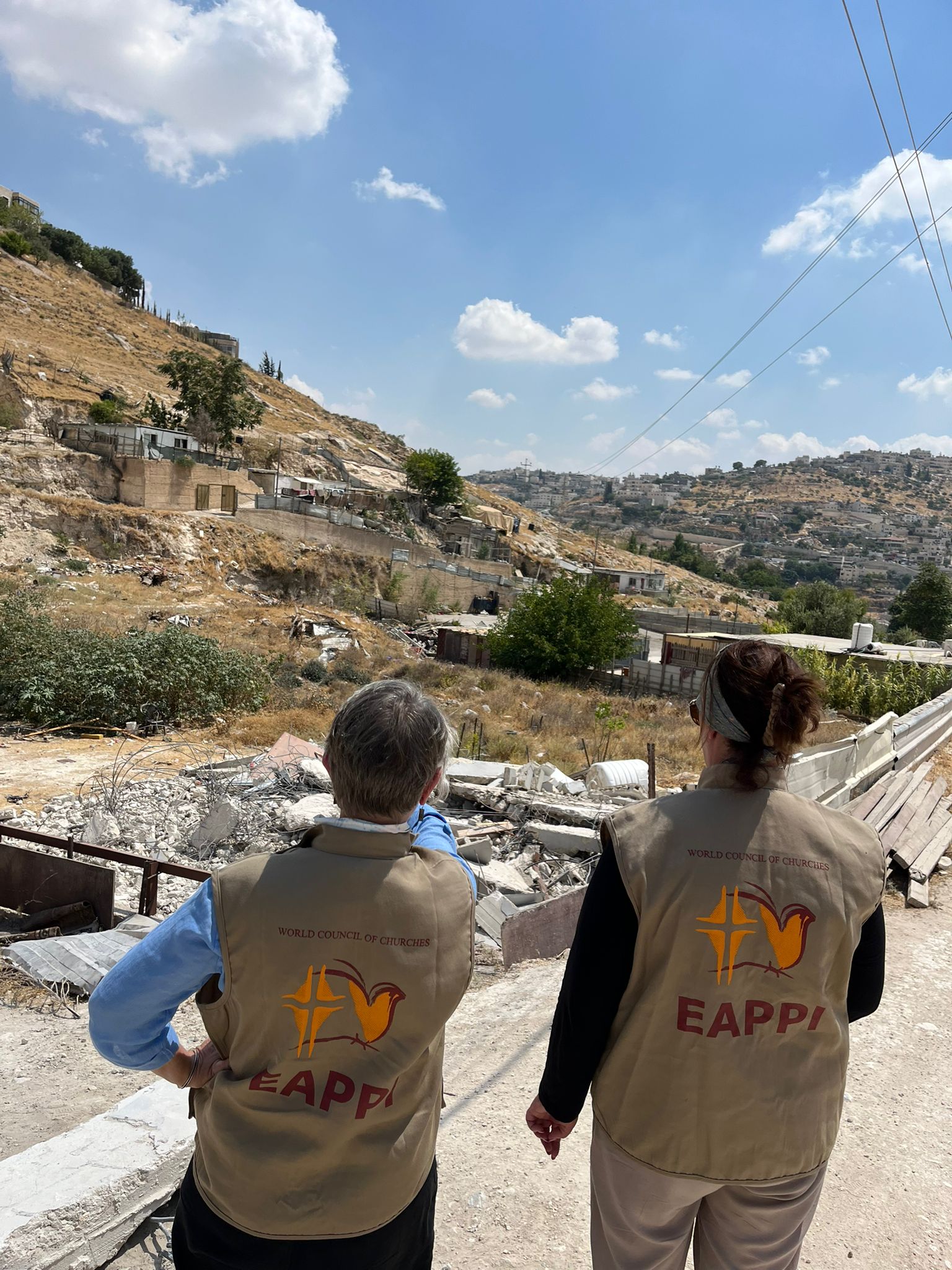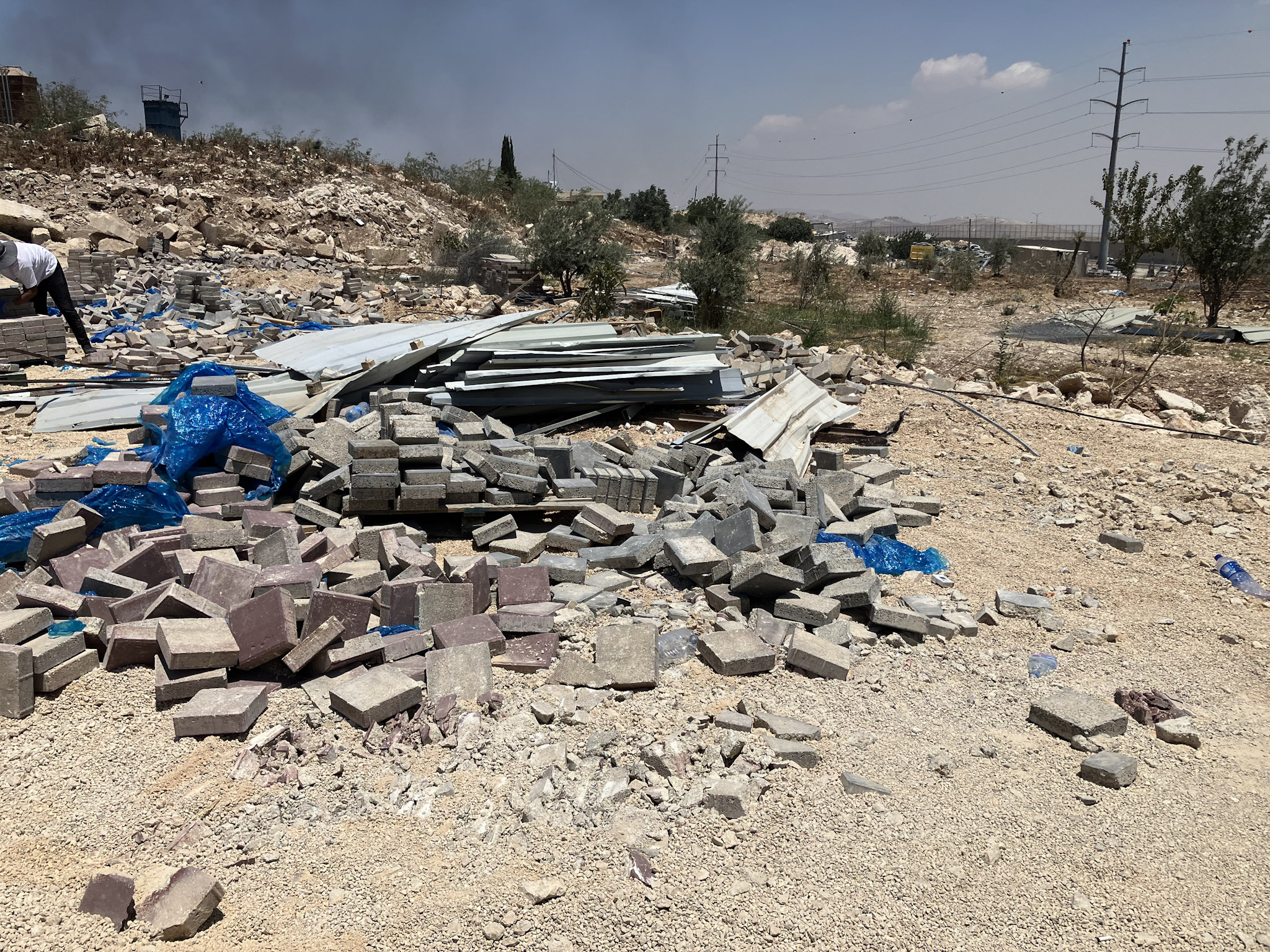‘In what other country would you be required to demolish the house you built and on land you own? They want us out of here and off our land so they can take over and move in.’
Talia*, Jaba al Mukkabir
Can you imagine having to demolish the house you have built on the land that you own for your family? Can you imagine standing before a bulldozer pleading that your house isn’t torn down? For Palestinians, Talia* and Tuman, that was their reality in the villages of Jaba al Mukkabir and Anata in the occupied West Bank.
We met with Talia on 7 July 2024, when she self-demolished her home. She told us that she had received a demolition order from the Israeli military on 29 June ordering that the house was demolished in 7 days. She was also fined 150,000 NIS (approx.£31,800.00). Rather than have the Israeli authorities demolish her home, she demolished it herself. When we asked her why, she replied that she would be fined a higher amount if the authorities did so, and that this was the cheaper option. She pondered;
‘I am on my own with five children and their grandmother. I have no shelter. What am I to do?’

EAs look over Talia’s demolished home in Jabal al Mukabber, 7 July
Tuman and her family had no notice of the demolition of their home until the Israeli authorities arrived, along with heavy machinery, at 5AM on 22 July. We met with her as the bulldozers were departing.
She owns the land, and her lawyers had been fighting a ‘stop work order‘ she received from the Israeli military four years ago, which has prohibited her from developing, or making any repairs on her home. When the Israeli authorities arrived to demolish it, Tuman and the others living there were given no time to remove any of their belongings. Two families lived here, 12 in total, including five young children.
Her son told us how his mother stood in front of the bulldozer and pleaded with the army not to demolish her home, and she tried to show them the ownership papers;
‘They have no respect for us, and all I can do is to call on God because no one else answers.’

Tuman’s demolished home in Anata, 22 July 2024
Demolitions often occur when Palestinians build properties or expand their existing ones to accommodate family growth, or for their livelihoods without building permits. All building permits in Area C – which makes up more than 60% of the West Bank and is under full Israeli military control – are subject to approval by the Israeli authorities. High costs, lengthy processes, and an extremely rare approval rate, means that Palestinians have little choice but to build without permits.
A recent report by Bimkom, an Israeli human rights organisation, found that 99% of applications for building permit requests by Palestinians were rejected between 2016 and 2020.
‘Israel’s planning policy is aimed at preventing Palestinian development and dispossessing Palestinians of their land, with a view to enabling Israel to use as much of the West Bank for its own needs.’
Talia and Tuman have not only been prevented from building homes for their families due to the near impossibility of obtaining a permit but also the expansion of illegal Israeli settlements in their areas which have appropriated large tracks of land and resources.
Talia lives in Jabal al Mukkabir to the south of the city of Jerusalem. Over 22,000 Palestinians live here and the town is enclosed by two Israeli settlements to the south, and two to the west, where over 15,000 settlers live.
Tuman lives in Anata, a Palestinian town just 4km northeast of Jerusalem’s Old City. The Palestinian population is approximately 40,000 and the town is encircled by the Separation Barrier, and effectively cut off from Jerusalem and surrounding villages by the settlement of Pisgat Ze’ev and an Israeli military base.
A senior representative from Palestinian human rights organisation, Al Haq told us that;
‘Israel’s demolition policy creates a coercive environment for Palestinians, putting pressure on them to leave their areas of residence to be replaced with Israeli settlers.’
A recent UN report noted that the size of existing Israeli settlements expanded dramatically between November 2022 and October 2023. Over 24,000 housing units within Israeli settlements in the West Bank were advanced during this period, the highest on record since monitoring began. This included over 9,500 units in East Jerusalem.
Settlement plans accelerated further still after the violence in Gaza began on 7 October, with Israeli human rights organisation, Peace Now, describing 2024 as as ‘ by far a peak year for Israeli land seizure in the occupied West Bank.’ Peace Now have criticised the Israeli government decision to promote the construction of more than 6,000 new housing units in settlements throughout the West Bank, viewing it as a move by the current government to dismantle any possibility of a political solution between Israelis and Palestinians.
As building plans for Israeli-only homes accelerate, more than 1,200 Palestinian homes have been demolished already in 2024, the highest number in a single year, in over a decade.
The UN report concluded that the policies of the current Israeli government appear aligned, to an unprecedented extent, with the goals of the Israeli settler movement to expand long-term control over the West Bank, including East Jerusalem, and to steadily integrate this occupied territory into the State of Israel.
In July 2024, the International Court of Justice (ICJ) advisory opinion stated that the Israeli military occupation of Palestine is illegal, and ordered Israel to evacuate all settlers and make reparation for the damage caused. The ruling has created a vital opportunity for the international community to take meaningful action to honour the findings of the court.
Take action!
-
Sign and share our urgent action on the ICJ’s Palestine ruling! In the UK? Sign here. In Ireland? Sign here.
-
Learn more about life in the West Bank here.
-
Visit our action page to keep up to date with our other campaigns, subscribe for updates and follow us on social media.
What does international law say?

